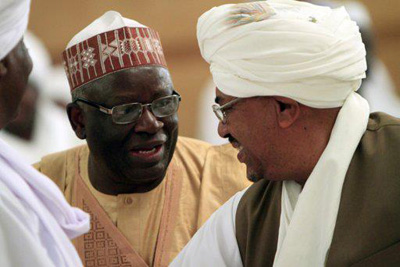
In March 2004 the U.N.'s IRIN news service reported on the events of the previous month near Tawila in North Darfur. It was a brutal episode, but there would be many hundreds more such:
In an attack on 27 February 2004 in the Tawilah area of northern Darfur, 30 villages were burned to the ground, over 200 people killed and over 200 girls and women raped—some by up to 14 assailants and in front of their fathers who were later killed. A further 150 women and 200 children were abducted.
Eight years later, events of a rather different sort were transpiring. The man who had been presiding over the slaughter of civilians in the Tawila area, Janjaweed leader Musa Hilal, was now presiding over the wedding of his daughter to the Chadian President Idriss Déby (January 20, 2012). There were a number of ironies in this wedding, including the fact that Déby is a member of the non-Arab Zaghawa tribe, the same ethnic group that has been slaughtered in horrific fashion in places such as Tawila and elsewhere in Darfur.
But more than ironic, indeed deeply perverse, was the presence at this wedding party of the U.N./African Union Special Representative to the peacekeeping force in Darfur known as UNAMID: Nigeria's Ibrahim Gambari. Newswire photographs have appeared that show Gambari in attendance, indeed chatting it up with the leader of the Khartoum regime, President Omar al-Bashir. Bashir's presence was both predictable and in its grim way appropriate: It was his regime that had released Hilal from prison (he was serving time for serious felony convictions) and put him to work creating militias from his Um Jalal and other Arab tribal groups in North Darfur. The Khartoum regime provided him with weapons, logistics, intelligence, and most important, protection. His instructions were clear: destroy the non-Arab people of Darfur. The Janjaweed, now often recycled into other paramilitary or "police" forces, have continued their brutal predations, if now on a lesser scale; they also continue to enjoy complete impunity, total protection from international justice efforts.

So we know why Bashir was at the wedding. But why was Gambari there, photographed in animated conversation with Bashir? Why would he attend the wedding festivities for the daughter of a man linked in all credible human rights reporting on North Darfur with the very worst atrocity crimes—in fact, responsible for directing these crimes?
Perhaps it's appropriate to ask first how this question will be answered by Darfuris: already deeply mistrustful of UNAMID and Gambari in particular, they will see him now as colluding fully with the Khartoum regime. These photographs have rapidly spread on the Internet and we can be sure that a great many Darfuris, both in the diaspora and within the region itself, have seen them. They already see Gambari as responsible for the intolerable levels of insecurity that define displaced persons camps and most rural areas. And they already see him as the man who self-servingly insists that violence is down dramatically, even as more than a million Darfuris have been newly displaced since UNAMID took up its mandate on January 1, 2008. Some 400,000 have been displaced on Gambari's watch alone (he took office on January 1, 2010), including approximately 100,000 this past year.
Gambari clearly sees it as his main task to downplay the failure of UNAMID to protect Darfuris, to help obscure the deepening humanitarian crisis deriving from security restrictions imposed by Khartoum on international relief organizations, including those of the United Nations. And there are other silences. Gambari never mentions, for example, the continuing avalanche of rape throughout Darfur, even as Radio Dabanga provides almost daily accounts of one soul-destroying attack after another. Khartoum refuses even to acknowledge that rape has been an issue in Darfur, and Gambari is all too willing to accommodate the regime's sensibilities.
So what was the response of the U.N. to Gambari's morally grotesque decision to attend the wedding of Musa Hilal's daughter? Dogged reporting by Inner City Press finally compelled this response:
The Department for Peacekeeping Operations (DPKO) advises the following: JSR Gambari attended the wedding [of Musa Hilal's daughter] at the invitation of President Deby of Chad, who is an important regional partner in the peace process. JSR Gambari had no control over the guest list and it is contrary to basic diplomatic courtesy and African traditions to ignore greeting other invited guests.
But this disingenuous response ignores the fact Gambari certainly knew that Musa Hilal would be present at his own daughter's wedding: does the U.N. really believe that "basic diplomatic courtesy" or "African traditions" require that the chief representative of the protection force in Darfur be present at a social occasion hosted by the most notorious of Janjaweed leaders? A man who is subject to a U.N. travel ban and described by Human Rights Watch as "the poster child for Janjaweed atrocities in Darfur"?
This is not an explanation; this is the U.N. protecting its own, even one of its most incompetent.
UNAMID is all too representative of the U.N.'s failure, of many years, to provide anything approaching adequate protection for Sudanese civilians, despite extraordinary expenditures and bloated (if ill-conceived) budgets. The lack of leadership is a main reason, and Gambari's profoundly ill-considered decision to attend the wedding of Musa Hilal's daughter is emblematic of this larger failure.
Eric Reeves is a professor at Smith College and has published extensively on Sudan, nationally and internationally, for more than a decade.

